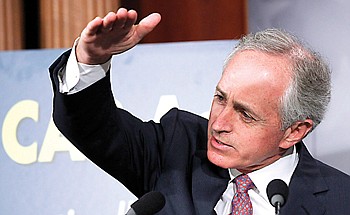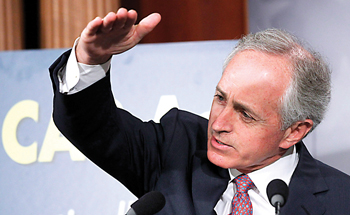Corker introduces bill to tackle the deficit
Wednesday, February 2, 2011
WASHINGTON, D.C.-The federal government currently takes in a lot less revenue than it spends, and U.S. Sen. Bob Corker has a plan to flip that equation on its head.
On Tuesday, Corker, R-Tenn., introduced a bill with U.S. Sen. Claire McCaskill, D-Mo., that would require Congress to cap all spending at a "declining level" of the country's gross domestic product over the next decade.
Entitled the CAP Act, which stands for the Commitment to American Prosperity Act, the legislation would slowly bring federal spending to 20.6 percent of GDP, down from its current level of 24.7 percent, according to Corker. The target of 20.6 percent of gross domestic product is the average of federal spending over 1970-2008.
The bill "forces us absolutely to prioritize, so there's no question it will constrain us," Corker said at a news conference unveiling the proposal.
"The toughest thing we have around here, though, is cutting existing programs because they all have constituencies, but there's no question that this bill will force us to do it," he said.
Under the legislation, Congress could only override the declining spending cap if two-thirds of the members in both the House and Senate voted to do so.
U.S. Sen. Lamar Alexander, R-Tenn., and Georgia Republican Sens. Saxby Chambliss and Johnny Isakson are also original co-sponsors of the legislation.
The bill caps all federal spending, which includes both discretionary programs-the annual appropriations budget that includes such items as defense and education spending-and mandatory programs such as Social Security and Medicare.
"What this bill forces us to do is to look at Social Security and Medicare for the long haul," Corker added.
When pressed on what specific discretionary programs the senators could go after to find budget savings, all the sponsors refused to single out any particular agency's budget that they would want to see cut.
"This is a macro approach and if we take micro examples and try and apply them, all you are going to end up doing is creating animosity ... toward looking at it in total," Isakson said.
If enacted, the proposal would force the Office of Management and Budget to abide by the spending cap if Congress ever proved incapable of making the cuts itself, which would mean the executive agency would be tasked with cutting the budget for popular programs such as Social Security.
"This bill is all about causing waves. It's all about helping Congress get the backbone to say 'no,'" said McCaskill, the bill's sole Democratic co-sponsor, who admitted that supporting the legislation could keep her from being re-elected in 2012.
Last week, the Congressional Budget Office reported that the national deficit will reach a record of more than $1.5 trillion in fiscal year 2011-a figure that has lawmakers in both parties concerned.
Corker says he hopes his legislation can be brought to a vote before Congress has to vote to raise the federal debt ceiling.
The McCaskill-Corker proposal is just the latest proposal in a litany of procedural cures-lacking in any specifics-for the nation's deficit woes. Several lawmakers have proposed amending the Constitution to require a balanced budget, a proposal that seems to have virtually no chance of being adopted with the requisite two-thirds majority of both House and Senate. But they allow lawmakers to look tough on spending without offering any painful solutions.
"Despite their posture of making tough choices, these are 'Look, Ma, no hands' proposals," Bob Greenstein, founder of the left-leaning Center on Budget and Policy Priorities, told The Associated Press. "But make no mistake about it-they would lead to enormous changes affecting nearly all Americans."
The Associated Press contributed to this story.
Follow Matt Laslo on Twitter by following this link.

